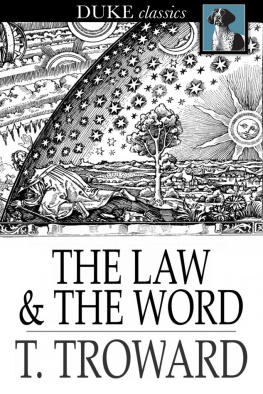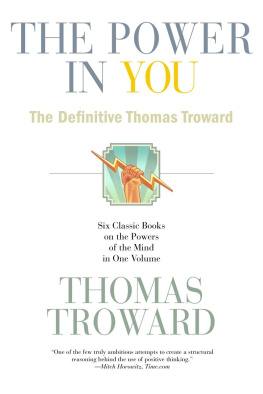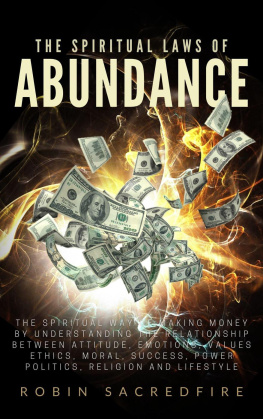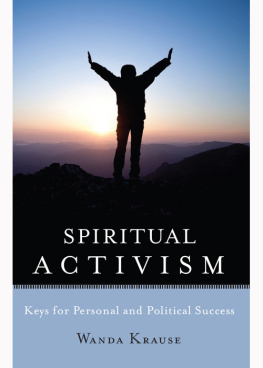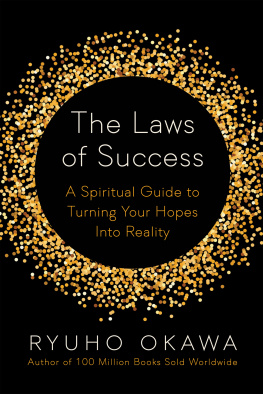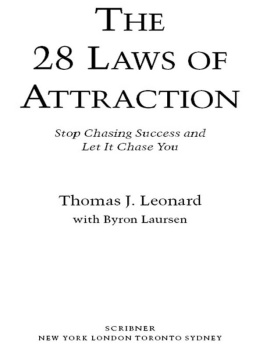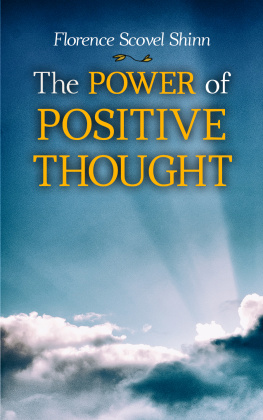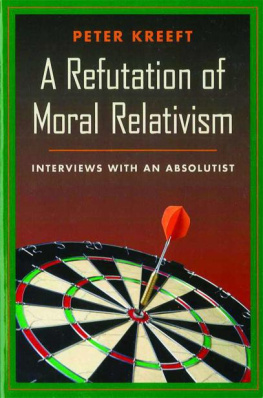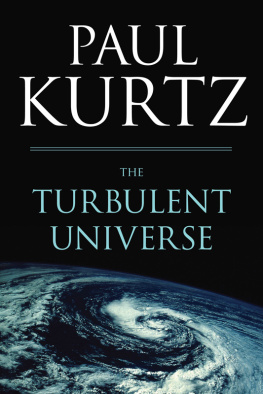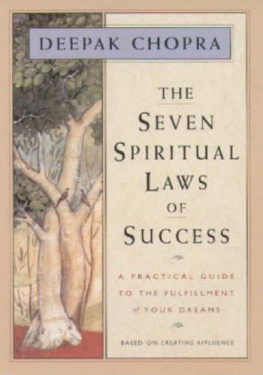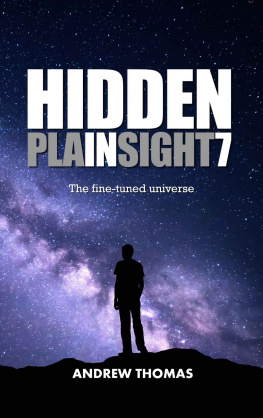Thomas Troward - The Law and the Word
Here you can read online Thomas Troward - The Law and the Word full text of the book (entire story) in english for free. Download pdf and epub, get meaning, cover and reviews about this ebook. publisher: Duke Classics, genre: Science. Description of the work, (preface) as well as reviews are available. Best literature library LitArk.com created for fans of good reading and offers a wide selection of genres:
Romance novel
Science fiction
Adventure
Detective
Science
History
Home and family
Prose
Art
Politics
Computer
Non-fiction
Religion
Business
Children
Humor
Choose a favorite category and find really read worthwhile books. Enjoy immersion in the world of imagination, feel the emotions of the characters or learn something new for yourself, make an fascinating discovery.
- Book:The Law and the Word
- Author:
- Publisher:Duke Classics
- Genre:
- Rating:5 / 5
- Favourites:Add to favourites
- Your mark:
- 100
- 1
- 2
- 3
- 4
- 5
The Law and the Word: summary, description and annotation
We offer to read an annotation, description, summary or preface (depends on what the author of the book "The Law and the Word" wrote himself). If you haven't found the necessary information about the book — write in the comments, we will try to find it.
In this era of moral relativism, many people have come to believe that life -- and by extension, the universe -- is inherently random. Not so, argues prominent self-help author T. Troward. To the contrary, the author contends in The Law and the Word that the universe is governed by a strict set of moral, spiritual, and metaphysical principles, and that only by learning and adhering to these natural laws can individuals achieve true success and fulfillment. An interesting and inspiring read for those drawn to the personal development genre.
The Law and the Word — read online for free the complete book (whole text) full work
Below is the text of the book, divided by pages. System saving the place of the last page read, allows you to conveniently read the book "The Law and the Word" online for free, without having to search again every time where you left off. Put a bookmark, and you can go to the page where you finished reading at any time.
Font size:
Interval:
Bookmark:

First published in 1917
ISBN 978-1-62011-015-7
Duke Classics
2012 Duke Classics and its licensors. All rights reserved.
While every effort has been used to ensure the accuracy and reliability of the information contained in this edition, Duke Classics does not assume liability or responsibility for any errors or omissions in this book. Duke Classics does not accept responsibility for loss suffered as a result of reliance upon the accuracy or currency of information contained in this book.
How is one to know a friend? Certainly not by the duration ofacquaintance. Neither can friendship be bought or sold by servicerendered. Nor can it be coined into acts of gallantry or phrases offlattery. It has no part in the small change of courtesy. It is outsideall these, containing them all and superior to them all.
To some is given the great privilege of a day set apart to mark thearrival of a total stranger panoplied with all the insignia offriendship. He comes unannounced. He bears no letter of introduction. Nomutual friend can vouch for him. Suddenly and silently he stepsunexpectedly out of the shadow of material concern and spiritualobscurity, into the radiance of intimate friendship, as a picture isprojected upon a lighted screen. But unlike the phantom picture he is aninstant reality that one's whole being immediately recognizes, and theradiance of fellowship that pervades his word, thought and action holdsall the essence of long companionship.
Unfortunately there are too few of these bright messengers of God to bemet with in life's pilgrimage, but that Judge Troward was one of themwill never be doubted by the thousands who are now mourning hisdeparture from among us. Those whose closest touch with him has been thereading of his books will mourn him as a friend only less than those wholistened to him on the platform. For no books ever written more clearlyexpressed the author. The same simple lucidity and gentle humanity, thesame effort to discard complicated non-essentials, mark both the man andhis books.
Although the spirit of benign friendliness pervades his writings andilluminated his public life, yet much of his capacity for friendship wasdenied those who were not privileged to clasp hands with him and to sitbeside him in familiar confidence. Only in the intimacy of the firesidedid he wholly reveal his innate modesty and simplicity of character.Here alone, glamoured with his radiating friendship, was shown thewealth of his richly-stored mind equipped by nature and long training todeal logically with the most profound and abstruse questions of life.Here indeed was proof of his greatness, his unassuming superiority, hishumanity, his keen sense of honour, his wit and humour, his generosityand all the characteristics of a rare gentleman, a kindly philosopherand a true friend.
To Judge Troward was given the logician's power to strip a subject bareof all superfluous and concealing verbiage, and to exhibit the gleamingjewels of truth and reality in splendid simplicity. This supremequality, this ability to make the complex simple, the power tosubordinate the non-essential, gave to his conversation, to hislectures, to his writings, and in no less degree to his personality, adirect and charming navet that at once challenged attention andcompelled confidence and affection.
His sincerity was beyond question. However much one might differ fromhim in opinion, at least one never doubted his profound faith andcomplete devotion to truth. His guileless nature was beyond ungeneroussuspicions and selfish ambitions. He walked calmly upon his way wrappedin the majesty of his great thoughts, oblivious to the vexations of theworld's cynicism. Charity and reverence for the indwelling spirit markedall his human relations. Tolerance of the opinions of others,benevolence and tenderness dwelt in his every word and act. Yet hiscareful consideration of others did not paralyze the strength of hisfirm will or his power to strike hard blows at wrong and error. Thesearch for truth, to which his life was devoted, was to him a holyquest. That he could and would lay a lance in defence of his opinions isevidenced in his writings, and has many times been demonstrated to thediscomfiture of assailing critics. But his urbanity was a part ofhimself and never departed from him.
Not to destroy but to create was his part in the world. In developinghis philosophy he built upon the foundation of his predecessors. No goodand true stone to be found among the ruins of the past, but wascarefully worked into his superstructure of modern thought, radiant withspirituality, to the building of which the enthusiasm of his life wasdevoted.
To one who has studied Judge Troward, and grasped the significance ofhis theory of the "Universal Sub-conscious Mind," and who also hasattained to an appreciation of Henri Bergson's theory of a "UniversalLivingness," superior to and outside the material Universe, there mustappear a distinct correlation of ideas. That intricate and ponderouslyirrefutable argument that Bergson has so patiently built up by deepscientific research and unsurpassed profundity of thought andcrystal-clear reason, that leads to the substantial conclusion that manhas leapt the barrier of materiality only by the urge of some externalpressure superior to himself, but which, by reason of infinite effort,he alone of all terrestrial beings has succeeded in utilizing in asuperior manner and to his advantage: this well-rounded and exhaustivelydemonstrated argument in favour of a super-livingness in the universe,which finds its highest terrestrial expression in man, appears to be thescientific demonstration of Judge Troward's basic principle of the"Universal Sub-conscious Mind." This universal and infiniteGod-consciousness which Judge Troward postulates as man'ssub-consciousness, and from which man was created and is maintained,and of which all physical, mental and spiritual manifestation is a formof expression, appears to be a corollary of Bergson's demonstrated"Universal Livingness." What Bergson has so brilliantly proven bypatient and exhaustive processes of science, Judge Troward arrived at byintuition, and postulated as the basis of his argument, which heproceeded to develop by deductive reasoning.
The writer was struck by the apparent parallelism of these twodistinctly dissimilar philosophies, and mentioned the discovery to JudgeTroward who naturally expressed a wish to read Bergson, with whosewritings he was wholly unacquainted. A loan of Bergson's "CreativeEvolution" produced no comment for several weeks, when it was returnedwith the characteristic remark, "I've tried my best to get hold of him,but I don't know what he is talking about." I mention the remark asbeing characteristic only because it indicates his extreme modesty anddisregard of exhaustive scientific research.
The Bergson method of scientific expression was unintelligible to hismind, trained to intuitive reasoning. The very elaborateness andmicroscopic detail that makes Bergson great is opposed to JudgeTroward's method of simplicity. He cared not for complexities, and theintricate minuti of the process of creation, but was only concernedwith its motive powerthe spiritual principles upon which it wasorganized and upon which it proceeds.
Although the conservator of truth of every form and degree whereverfound, Judge Troward was a ruthless destroyer of sham and pretence. Tothose submissive minds that placidly accept everything indiscriminately,and also those who prefer to follow along paths of well-beaten opinion,because the beaten path is popular, to all such he would perhaps appearto be an irreverent iconoclast seeking to uproot long accepted dogma andto overturn existing faiths. Such an opinion of Judge Troward's workcould not prevail with any one who has studied his teachings.
Font size:
Interval:
Bookmark:
Similar books «The Law and the Word»
Look at similar books to The Law and the Word. We have selected literature similar in name and meaning in the hope of providing readers with more options to find new, interesting, not yet read works.
Discussion, reviews of the book The Law and the Word and just readers' own opinions. Leave your comments, write what you think about the work, its meaning or the main characters. Specify what exactly you liked and what you didn't like, and why you think so.

